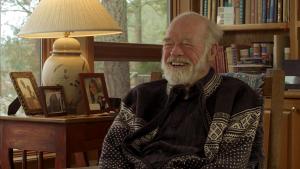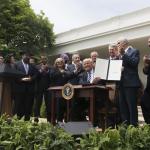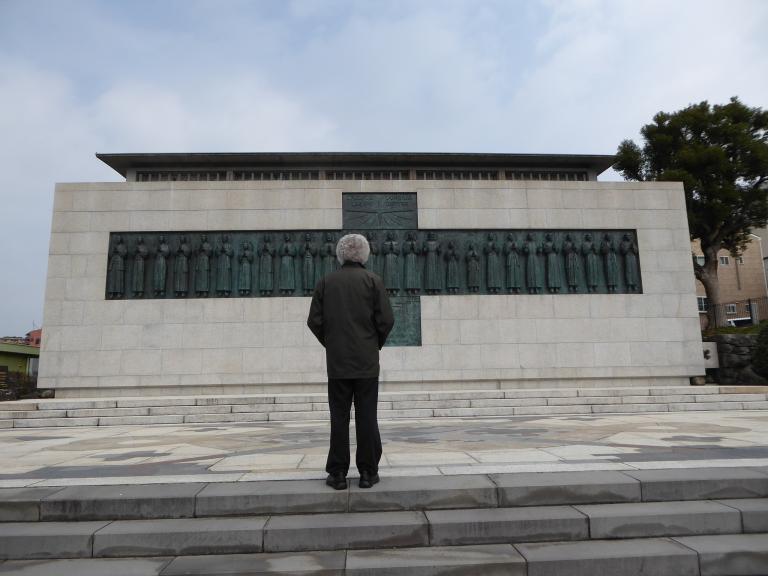By Philip Yancey
 This week I lost a friend, and the world lost one of God’s favorites: Eugene Peterson. Other blogs and websites are reporting on his many accomplishments as a pastor, professor, and author. Rather than repeat the many well-deserved eulogies in his honor, I thought back to snapshots of some of the times that our paths crossed.
This week I lost a friend, and the world lost one of God’s favorites: Eugene Peterson. Other blogs and websites are reporting on his many accomplishments as a pastor, professor, and author. Rather than repeat the many well-deserved eulogies in his honor, I thought back to snapshots of some of the times that our paths crossed.
The Message
First, Eugene rewrote the book of Galatians for his local church, the genesis of what would become a 12-year-long undertaking to render the original languages of the Bible into modern, colloquial English. I remember a weekend when a group of us writers got together to bemoan our plight, gossip about publishers, and share each other’s works in progress. Eugene had just paraphrased some of the Psalms, his favorite Bible book, and read them to us.
Over dinner that evening, the writer Harold Fickett said, “Eugene, I think you’ve found your calling. Stop whatever else you’re doing and paraphrase the entire Bible.” Eugene stared at him for a moment, flashed that winning smile, and gave his patented “Heh, heh” laugh. To our astonishment (and his), he embarked on that herculean effort
More than a decade later, Eugene called me with a question. By then The Messagewas well on its way to selling over twenty million copies. “Philip, what am I supposed to do with all this money?” he asked. “I’m a pastor, a college professor. I’m not used to this.”
Vail
One of Eugene’s admirers sponsored a gathering of around forty friends at a mountain resort in Colorado and asked me to moderate the weekend. “We’d like you to respond to some of Eugene’s prepared talks and also interview him.” Great, I thought, I’ll save up all the questions that befuddle me and let Eugene answer them.
At the first session, I introduced Eugene by recalling the single fact that impressed me most about Eugene—not his theological acumen, his accomplishments, or his published works. “Eugene, I heard that when you were a young man, Roger Bannister visited your city shortly after becoming the first human to run a four-minute mile. Is it true that you ran an exhibition race with him and finished in 4’07”?”
Eugene gave that familiar smile, leaned back, and said. “Don’t believe everything you hear. I think it was more like 4’12”.”
During the rest of the weekend, I managed to sneak in all of my questions. Each time he would think for a few minutes before responding. His most common answer: “I don’t know.” No one could out-humble Eugene.
Pastor
As a public speaker, Eugene broke every rule in the book. His voice was strained and hoarse, somewhat like Bill Clinton’s. He stood with his feet close together, rocking back and forth on his toes. I could hardly believe he grew up in the Pentecostal tradition, this gentle introvert who never raised his voice and made few hand gestures. Yet when Eugene spoke, people listened.
The median church in the United States—the point at which half the churches are smaller and half are larger— has 75 regular participants in worship on Sunday mornings. If you take the average church size, including all the megachurches, the average church still has only 186 attenders. I know many overlooked pastors who look to Eugene for inspiration: whereas the media-savvy pastors of large churches get most of the publicity, Eugene showed that “success” in the shepherd role is measured more by faithfulness than by glitz and glamour. He lived out one of his book titles, A Long Obedience in the Same Direction.
Tucked away in a remote setting overlooking Flathead Lake in Montana, Eugene had an amazing naivete about the surrounding culture of celebrity and entertainment. When someone told him that Bono of the band U2 wanted to visit him, he asked, “And who is he?” On the day Princess Diana died, Eugene realized that he had never heard of her. He was far more interested in another person who died that same day: Mother Teresa.
Humor
Others are rightly reporting on Eugene’s purity and spirituality. Like John Stott, Eugene presented an example of a Christian leader who practiced what he preached, a role model sorely needed in a time when the media focus on leaders who succumb to temptation. Eugene taught us about “ordinary” spiritual disciplines such as prayer, staying married, showing up to worship in boring churches, and bearing one another’s burdens in community.
At the same time, Eugene had a wicked sense of humor. I love the story Eugene tells in his memoir, The Pastor. Serving under the Presbyterian Church USA, Eugene started a church in Maryland, which after three years grew to a membership of 200. As required, he submitted a monthly report to the denomination’s headquarters in New York City, consisting of one page of statistics and another on his own personal reflections. He writes, “After a year or so of doing this without any response…I started to wonder if my denominational superiors were reading past the first page of statistics. I thought I would test out my suspicion and have a little fun on the side.”
The next month he described a long slow slide into depression, sleeping little, working as a robot with no spirit, no zest. Should he continue in the pastorate? Could they recommend a counselor? No response.
The next month he wrote about a drinking problem that was affecting his Sunday preaching. Where could he get treatment? Again, no response.
The following month, he reported on an affair with a needy woman who ended up sleeping with him in the sanctuary, only to be discovered by women arranging flowers for Sunday worship. Each month Eugene exercised his storytelling gifts by concocting more elaborate fictions (always with his wife Jan’s cooperation). He told of spicing up a dull liturgical service with psychedelic mushrooms—could they please advise on whether he should proceed.
After three years, his supervisors invited him to New York for a review of his ministry. He asked if they had read his reports. “Oh, but we did,” the committee assured him. “We read those reports carefully; we take them very seriously.” Then he recounted his supposed drinking problem, his sexual adventure, and use of hallucinogens in the service.
“Their faces were blank, and then confused—followed by a splendid vaudeville slapstick of buck passing and excuse making. It was a wonderful moment. I replay the scene in my imagination a couple times a year, the way some people watch old Abbott and Costello movies.”
Home
I thought I had the ideal office for a writer, overlooking a mountain stream in the beautiful state of Colorado. Then I visited Eugene’s home, built in part by his ancestors, on a high ledge overlooking a Montana lake. We stood together on the porch, breathing in the pure air and the forest scents.
After a few moments of gazing at the idyllic scene, Eugene recalled one winter when ice was still forming on the lake. A deer in search of water wandered out too far, and fell through the ice. He knew that if he tried to help, the deer would panic and swim even farther into the frigid water. For half an hour he watched helpless as the young doe thrashed around in the water, trying to gain some purchase on the ice shelf, which immediately broke under her weight. Finally, against all odds, she somehow hauled herself up on an edge of more solid ice, shook herself and stood there for a moment, her sides heaving, and then bounded up the slope toward freedom.
I thought of that scene when I read the Peterson family’s reports of Eugene’s last days. “He is now in his own bedroom with a spectacular view of Flathead Lake. He is comfortable and well-cared for. It appears that he is talking with people that no one else can see. These, I believe, are not hallucinations; rather, he is being prepared for something too glorious for words.”
Like the deer, Eugene bounded away, free at last. We’ll miss you, dear friend.
Image taken from the video “Busyness, Sabbath, and Work as a Gift” from the Denver Institute.














